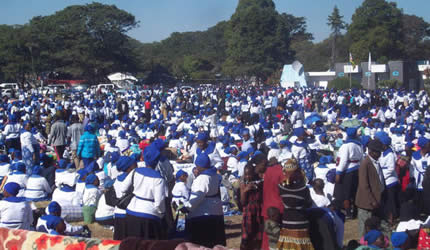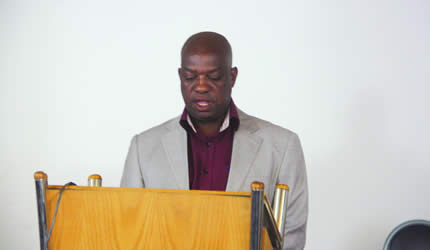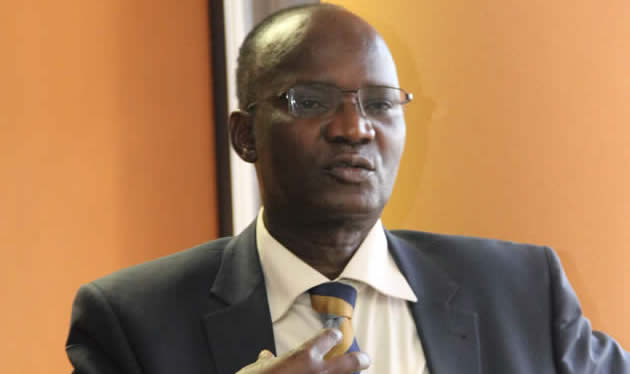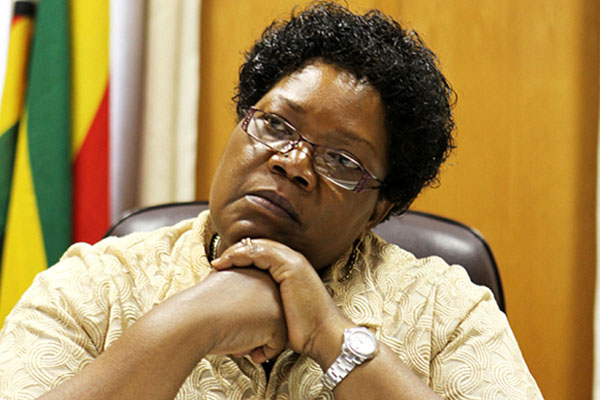Anglican Church — When secular sin sours the holy soul

In fact the village “laws” will frown upon those who laugh at the man’s action, untoward though it may be.
Don’t they know that he is mad, the village will say in indulgent, mild reprimand. We stretch the tolerance threshold to accommodate weird actions of village lunatics.
The silence he had not budgeted for
I think the MDC-T Secretary-General must be the most deeply hurt finance minister and fellow this country has ever had. You do not present a budget — itself a watershed event for any nation – and it’s all quiet soon after and ever. And his statement was long, very long, too long for the elongated silence that followed.
Equally, the preliminaries to it were both loud and far flung. We went far. He went wide, this lawyer so cruelly thrust into figures and theories of this dismal science we call economics. We all thought these were painstaking preliminaries to a great event sure to be talked about for many moons, well etched in living memories.
But after all that elaborate ritual, then this yawning void? Surely the bowels were full, explosively full to guarantee some spectacle at the point and moment of discharge? The preliminaries gave multiple bursts of explosive, sharp farts that echoed throughout the village — clearly a great build-up to a great discharge, or so we all thought.
And now this? Why is the village not shouting? Not even twisting its face at the effluvia. Why? And the man is still squatting, the day very broad, its skies so blue, village eyes well and truly seeing.
Has the village gone blind with its open, wide eyes? Or lost its judgment? Or . . . or could it have concluded that its son’s head might . . . might no longer be correct? Hameno!
Not a juicy squat
Then hard on the heels of that damp squib of a budget comes this one — Juice. Launched only two days ago to great digital cacophony, the induced frenzy has not caught up, won’t catch up. Again, the village is indifferent. Phlegmatic! Except for the occasional derisive hisses feebly put. And you leer hard to hear or catch them.
Where do we get juice? From a fruit! When do we suck juice? Well, between meals when you are out in the vlei, herding cattle. Well, after a good, filling meal as desert, if you are the Prime Minister’s son or daughter. But there is general unanimity that juices — natural or synthetic — hardly stay in the stomach to give you a durable day of hard work. They do not sit in the stomach the way a mound of hard mugaiwa sadza does, better still sadza from mhunga mealie meal.
That one stays, propelling you forward and making you tough enough to tackle any task, all tasks, however hard.
Anyway, what juice is it? Remapfura, mawonde, mawuyu kana marete, uya wataiti muto watodzvi – small bird todzvi’s nectar? If they promise us juice, who provides the main, filling meal?
And where do the million jobs come in? In manufacturing the juice, or in the village urchins who scramble for wild fruit back in the village, happy for a saccharin moment? Even the supportive Newsday talks of “dangling” a million jobs, implying some tantalising deceit.
You do not want to crouch twice at the same crossroads, with no one taking notice. It is a hard fate for any politician, harder fate for a political party about to go to the polls. But that is not my subject this week.
The day divorce made a faith
The Anglicans, what the Hell is going on, literally? A bit of a story on how we ended up with Anglicanism, the Catholic Church’s haughty, naughty cousin. Great books of history tell us the English Reformation started in the reign of Henry VIII after this great, controversial monarch decided to rid himself of his first wife, Catherine of Aragon, who would not give him a son, an heir to his throne.
And by then, Catherine was old, too old to conceive.
So the great king turned to Anne Boleyn and wanted the pontiff to sanction his divorce first, and then his second marriage to beautiful Anne who in the king’s lustful eyes promised a pregnancy that would give him a son.
But under Catholic doctrine, divorce was no simple matter. It could condemn a soul, blight a faith, bring a lasting curse on humankind.
It was an abomination, both before man and God, and the great pontiff, ruling in Rome, would not grant the English king’s acutely anxious wish.
To add enormity to the whole saga, the matter was couched as recalcitrant Rome, which would not grant England her wish. Immediately the altercation became cosmic, creating a fatal breach in Christendom.
When the scepter beat the mace
Were the English king to proceed with a divorce, Rome would swiftly excommunicate him, and the king, being the sum of the people he lorded over, would by his excommunication precipitated the condemnation of a whole people in the eyes of God. In the 16th Century, which is when this great altercation took place — cursed be the times — belief ruled deep and supreme, with each and all living strictly on precepts of the faith, living for the redemption of the soul in the hereafter.
A curse of the soul was a very forbidding prospect, and all was, had to be done to avert it. The great king made a second appeal. Still the great pontiff would not indulge the king, would not grant a papal dispensation. But this is the King of England for Christ’s sake — again literally!
Favours to the king could not pass for precedent, surely? They would be favours Sui generis, argued the love-smitten king so worried about the crown after him and for the fate of his soul in the hereafter. By 1533, the king had mustered enough anger to order the Archbishop of Canterbury to grant him a divorce so he could marry sweet Anne Boleyn, but without feeling guilty of great apostasy.
Torn between the scepter and the mace, the archbishop kow-towed to the scepter. That way the scepter won over the mace, won in respect of desires of the flesh, not of faith.
Rich monasteries, indolent monks
Something else worked in Henry’s favour. Run from faraway Rome, the Catholic Church was viewed in lowbrow England as a gross intrusion. So given to asking for fees on practically everything — from cradle to the grave — it was deeply resented as extractive and parasitic, a prime source of the common Englishman’s woes and poverty. It haunted life from cradle to the grave, squeezed all possibilities out of poor lives.
The Church was filthy rich, its laity very poor, and poorer by each day. But its demands remained unremitting. And its monasteries housed fat and indolent monks who knew no work but who ate enormously at the expense of commoners.
When Henry decided to take on the Catholic Church, first by the act of divorce and then remarriage, then by challenging its ecclesiastical and therefore secular suzerainty, the ground was fertile, very fertile for such a crusade.
An Act of Parliament in 1534 made Henry the Supreme Head of the Church, thereby displacing Rome and the Pope, thereby creating a Church of England (CoE), by which the Anglican Church is known to this day. Thereafter a great church, great faith was born, from a marital divorce! Few in the Anglican Church acknowledge this dubious parentage, again literally.
The tricky inquiry
Using Thomas Cromwell, his chief minister, the king tackled the monks who represented institutionalised indolence of Catholicism, but brainy and thus potentially vexatious to the governance of the realm, this schooled indolence.
A campaign to discredit the monks was mounted, and took the form of state-led interrogation: “Do you keep all of your vows?” If the monk answered “yes”, we read, then by that answer, he would have broken the vow of silence. If he refused to answer, he would have failed to help the king who in scriptures was reckoned as God’s deputy!
Or worse, was the monk hiding something? The final report after the great inquiry concluded monasteries were corrupt and full of vices. Monks were accused of enjoying sex, even of having many children.
Or drunk at Mass. By 1540, most monasteries had been shut down, or left to creeping English lichens, with few in England lamenting their departure. And of course Henry took the vast bulk of the wealth of the monasteries, much of which was used in bolstering England’s defences against France. One Robert Aske, a lawyer, led a feeble protest against this massive assault on the Church.
He was promptly arrested, hung from a church tower in chains, and left to starve to death.
Which he did, slowly, but to great indelible lesson to all living English dissenters. By the time Henry died in 1547, the Church of England had been born, its prayers conducted in English — not Latin — and from the English Bible!
The great partnership
Zimbabwe has an Anglican Church, a great one too, whose believers include the high and mighty, even heavy-weights in politics. It came to this land in the wake of colonialism, itself playing software to that historic development in our land.
And because it was the Church of the State in the land of its origins, it was transplanted to play a similar role in the politics of the BSA Company, the politics of Southern Rhodesia, of the Federation and ultimately of Rhodesia. While it gave us great priests and bishops who saw the poor in their gospel, it gave us very conservative, pro-UDI bishops and archbishops, including its very last one before the Union Jack came tumbling in 1980.
Of course Rhodes had ensured the Church, all churches, would grow henpecked by the colonial State. He gave the Church huge swarths of land. He gave the Church the coercive powers of the fledgling State, so proselytisation would proceed uninterrupted by Lobengula’s impis. After all efforts to proselytize outside a colonial framework had yielded very frustrating results, building a psyche within the church where the propagation of faith necessarily entailed the destruction of the Ndebele Kingdom. The church became a partner in the conquest of our country.
The doctrine of discovery
So Anglicanism, like other versions of western faiths, is a received faith, a received doctrine without roots in our pre-colonial African past. Not many people know what is termed “the doctrine of discovery” which is reckoned as the first body of international law, which made proselytisation a precondition for the recognition of colonial territorial claim by any colonising power.
It was a doctrine of the Catholic Church developed in the 15th Century to ensure that Spain and Portugal, both of them great Catholic States, would go about colonising the world with very little friction. But Anglican England embraced it, even though it had come from Rome. And the doctrine worked in two ways: all lands which were not under a “Christian prince”, not under Christian
authority and governed according to western precepts, were summarily treated as empty territory, “terra nullius” or “vacuum domicilium” in Latin and by that doctrine. And a cursory reading of Rhodesian colonial literature will readily show how that doctrine was elaborated throughout our colonial experience.
Secondly, effective claim to any such land needed conversion of the indigenes to Christianity, which then meant Catholicism. So apart from putting up pegs, growing foreign species of trees or some such labelling rituals, colonial expansion’s other principal peg and marker was the conversion of indigenes. It is often ignored that by colonial necessity, the church was a forerunner, a concurrent player or an inevitable consequence of the colonisation process.
The fight of no scruples
Our Anglicans here have been feuding, feuding for a very long period. This feud attracted lots of attention, huge emotions within the community of its faithfuls. But it also offered tantalising opportunities to local politics and politicians who thought this great feud by a holy institution could lend an aura of holiness to competing political causes. And the feuding church, so much stressed, so in need of allies – however unholy — was too wearied, too buffeted to scruple over its bedmates. It was not inconvenienced by the hard secular side of its allies or opponents, and both sides to the feud sought such secular allies.
The king, his zip and his throne
What was the source of the conflict? Good question, and when the dispute started, I thought I knew. It had something to do with the place and role of homosexuality in the Church of England, something, which would suggest a great moral question or even challenge to the Church doctrine.
Except the matter had arisen from values which both the old Labour government followed by the current Conservative British governments, sought to inculcate on greater society both in Britain and in the wider world. That matter, raised and propagated by a secular institution called the State, then resonated in the Church, right up to Lambeth, creating a great spasm which was potentially schismatic.
Why was the Anglican Church so susceptible to secular matters and debates? Why were its doctrines so susceptible to earthly disputes between princes of power? Well, because from the very beginning, the Anglican Church as founded on secular matters, never on a theological premise, on an ecclesiastical principle or argument. The issue was never how God was to be conceived, worshipped; what Jesus’ place was in the scheme of things and how mankind was to reach divinity. As my very simplified narrative has shown, the issue had a lot to do with the king, his zip and his throne. Power and sexuality, which is why homosexuality is the most appropriate reason for the Church’s division this epoch, our epoch. Of course, the difference is that while it was King Henry then, it is mere bishops now; while it was a king coveting a woman, it is now about a priest coveting another priest, of the same sex; while it was about the heir to the throne, today its about a heirless mace.
For what children issue when Bishop X marries Bishop Y of the same sex? And of course the Anglican Church can now afford to go for barrenness; it is now largely propertyless, having left little with Rome, having ceded most to the British monarch. That way it as dodged the succession issue, and with it the need for male life-giving marriages.
When oil qualifies an archbishop
But the Church recently got a new primate in the name of Justin Welby, a former oil executive who had been made a bishop just over a year before. He succeeds Rowan Williams, an intellectual from Eton condemned by fellow bishops as having given the Anglican church quite a dour reign. And before Welby’s appointment, the British Guardian had a great headline: “an archbishop who could do the business”! Literally, that is. Lambeth has a 4 billion pound asset base which needs to the managed profitably. It always commits upward of £160m in hot money institutions we call fund managers. It gambles. It looks at Wall Street with as much worry as any dealer in a treasury department of a bank or investing institution. Read any reviews on the new archbishop and you are struck by what he is being famed for. The Anglican Church applauds him for being an archbishop who “can run a spreadsheet”, in fact did so in Durham whose accounts he turned around! “In all organisational theory power follows money”, he is quoted to have once remarked, already as the bishop of Durham.
The Elf oil company manager is reputed to have survived in the sharp-elbowed world of finance, a skill which puts him in good stead given that the Anglican church is broke, needs money. Ironically, the new archbishop sat on the British parliamentary commission on banking scandals.
Much worse, his oil business saw him coming down to Africa, in Nigeria’s oil-rich Niger Delta where big oil companies exploit locals, blight their land and prospects, including for posterity. And all that background made him eminently suitable to be the church’ foremost prelate, only one year after being appointed a bishop. He gives Anglicanism an earthly touch, does he not, well in keeping with the foundations of its great kingly origins.
Men of earthly affairs
Who appointed Welby? Well the British government, Her Majesty’s government on the recommendations of the Crown Nominations Commission (CNC). This sixteen-member commission was chaired by Rt Honourable the Lord Luce KG, GCVO. Before, this well-decorated peer had been many things, including being a Minister of State in the Foreign and Commonwealth Office and, above all, being Commander and Commander-in-chief of Gibraltar, one of Great Britain’s colonial territories.
Clearly this is no Moses, suffused with holiness.
Only a man of human ways, some of them very secular. And the deliberations of the Commission are not akin to the 40-days and 40-nights in the desert we associate with Jesus. By the way, as the Commission does its work, there is great lobbying from great batters who will have committed millions in bating on who the next archbishop is going to be. Very down-to-earth process, if you ask me! This is the great ethos shaping the Anglican Church here and abroad, before and now, possibly into its great, infinite future.
The great, great questions
Dear reader, I have given you all this ponderous background so you are able to situate what has been happening to our local Anglicans, or those that call themselves that. Frankly, I am not quite sure now that I understand Anglicanism, or know who personifies it. Firstly, I am hard put to find a theological basis for the local altercation whose unraveling we have all witnessed with alarm. What was the great theological question in dispute, one that would lend holiness to the fight? What great principle of faith was in contest? As an Anglican I am no inheritor of Church assets. My durance in the church — I mean the brick and mortar structure — is for as long as the sermon lasts, regularly once a week, possibly slightly longer. Or for as long as the priest’s requiem mass will last, over my cold, un-hearing remains enroute to the graveyard. The church passes no great will to me or my scion who may be fated to its membership by parentage. It’s a convenient house of worship, which could take place anywhere, including under the poor shade of a sparse tree. Honestly what was my stake, what is my stake, in this quarrel in the local Church of England under whose intimidating vaults I have sought my Jesus, my God? I mean when Kunonga and Gandiya feud over this kindergarten, this school, this or that church building or asset, how does that impact on, how does that nourish my spirituality as an Anglican? And when Kunonga appears to win — as indeed happened in the past — or when Gandiya appears to prevail — as indeed appears the case now – just what is my spiritual stake as a worshipper, as the body of a soul seeking salvation in the afterlife?
Does holy violence still hurt?
And when supporters of either side throw fists in the air or bash an otherwise tranquil mass of air with their open palms, do I feel like I am in a church, in prayer, or somewhere else far, far way from Godliness? Why are signifiers of earthly politics appropriate gestures for every breakthrough in this feud?
Am I facing a great Christian dilemma, or am I caught up in the web of feuding princes of power? What is more, why is my church in a court of law, under an arm of a secular State? Is my faith and its principles so readily accessible to institutions of secular affairs? Is to be vindicated by a court of law, or to be condemned by the same court of law, a barometer of holiness? I go deeper, further. How have my feuding bishops fought each other?
With what amount of holiness? With what degree of difference vis-a-vis politicians and parties ezvematongerwo enyika? How are Christian disputes fought, won, resolved? Who joins, who is my ally in that fight? Is there something called Christian violence? What marks it apart? Does it create scars, hurt the human body? Hurt the soul, the national soul? Legitimise secular violence in the body-politic? Hurt the little children who have to leave a basement they called school, bemused and tagged “Kunonga’s daughter, Runyararo’s pre-school?” Or when I see framed pictures of bishops flung into a dustbin, is there much difference with a torn poster of a contesting politician and party?
Then great calls for “cleansing” ceremonies in all Cathedrals, all churches? Any difference with de-Zanufication or calls to purge Zimbabwe of sellouts? Why is the parlance of church feuding echoing the menacing sounds of bitter politics?
The politician did better
Victory for one, defeat for the other, both manifest not as great prayers, not as poor prayers respectively, but as eviction orders, as a tussle for the possession of locks and keys to buildings, to properties? It is the janitor or caretaker of a cathedral, not abbots, not caretakers of my faith and soul, who emerge as dramatis personae in this big drama I thought was over holiness? I am confused, greatly confused and do limp home suffering a fractured soul, painfully wondering why this great faith which reached us as conquest, still divides us further, still divides us for more, greater conquest in our days of Uhuru. I am confused.
I am wistful. My country is going for elections and not far off, I catch the menacing sound of long knives being sharpened, being pushed to and fro on eager whetstones by secular causes.
Soon their edges will be sharp, craving for slaughter, ushering a season of bitter tears. Certainly there is going to be a fight, a bloody fight and the air quivers with a bloody presentiment, with grim foreboding. When the arming clash comes, where will my bishop stand? Who will be the peacemakers? With what moral stature when the feuding politician has just witnessed feuding bishops, a feuding church showing no restraint, no rules, no compassion?
Not even forgiveness or tolerance! In fact, the feuding politician gladly reminds my bishop that he did far better than him in 1980. He reconciled, embracing erstwhile foe and newfound friend. Yet he was a godless Marxist. Did better than the man of the collar. And when the second fallout came in 2000, it was over a great political principle of resources and race, both of them deeply political. What is the Anglican dispute about, the politician shall ask when called by my bishop to stop the fight for peace, perfect peace? Still the politician will brag some more. He has Jomic.
The Anglican Church has vengeful winners, cheered on by an adversarial media, spokesmen better known for their urban political activism than for sermons of peace. They came to feuding bishops, loaned to them from parties. What’s going on? But all these regardless, the Anglican Church – here and abroad — has been true to tradition: that of a great secular institution with pretensions to heavenly visions; that of flesh over faith, sin over soul. And the property, which has caused the altercation was built by Rhodes’s children, against all of us, its feuding victims. What a great pity! Icho!







Comments